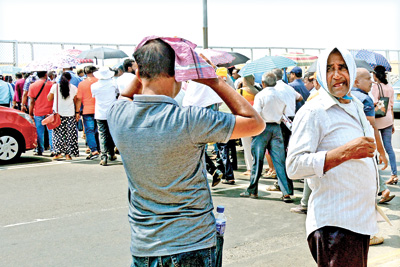News
Coming weeks anxious times for drought regions
With the heat exceeding 30C in many parts of the country drought conditions are worsening and causing fires lit carelessly in forests to quickly take hold.
In the past two weeks alone, four man-made fires were reported by the Kegalle Divisional Secretariat.
Divisional Secretary Mr. K.G.S. Nishantha said with the dry conditions the fires easily spread faster, damaging large areas.
“Most of these fires are man-made: people going hunting light fires and improper disposal of cigarette butts create other fires,” he explained.
The Divisional Secretary of Mawanella, Ms. P. Pethangoda, said it was sometimes difficult to send people to fight in areas where fires were spreading because of the terrain.
She also said the lack of rain meant 24 grama niladhari divisions had no drinking water.
In Galigamuwa, Divisional Secretary Susantha Herath said water resources were dwindling daily but that to date only two grama niladhari divisions had requested drinking water.
“Our office is equipped with a 11,000-litre bowser and a 3,000-litre bowser to distribute water when needed, and moreover, tanks have also been distributed throughout grama niladhari divisions,” he said.
The Disaster Management Centre said on Friday that 11,621 people were facing daily hardship over lack of water because of the drought. The Kegalle, Kandy and Ratnapura districts were the most affected.
The Power and Renewable Energy Ministry said the drought had sent up power demand in the country.
Daily demand is now 46.3 gigawatt hours, Director of Development Sulakshana Jayawardena said. Hydropower contributed 15 per cent of this, wind and solar contributed 3 per cent, and the balance 82 per cent was generated from coal and thermal power plants.
Mr. Jayawardena said the Castlereagh reservoir was 54.3 per cent full and the capacity of the other five main reservoirs was 64.5 per cent at Maussakelle, 55.4 per cent at Kotmale, 79.6 per cent at Victoria, 80 per cent at Randenigala and 66.3 per cent at Samanalawewa.
“The current weather conditions are not favourable for generating electricity as water has to be conserved for drinking, irrigation and environmental concerns,” he said.
Mr. Jayawardena said mini hydro power plants could not be used because their water sources had decreased due to insufficient rain.
“The ministry is currently proposing to connect 300 megawatts of thermal power to generate electricity in the future,” he said.
If the drought continues for another month the water board says it will have to begin distributing water to stricken areas.
“Currently we are only distributing water in the Kalutara district due to saltwater intrusion in drinking water sources. We have not started distributing to other areas yet,” the board’s General Manager, Eng. R.H. Ruvinis, said.
The Agriculture Ministry is also watching to see if the drought continues into the next month.
The Director of the ministry’s Socio-Economics and Planning Centre, Dr. R.M. Herath, said the Yala harvest forecast had been drafted on the basis that the prevailing drought conditions were normal for this time of year.
If the drought continues for another month the forecast would be changed and alternative arrangements made.
The All-island Farmers’ Federation National Organiser Namal Karunaratne, said farmers growing vegetables and fruit could be in trouble if the drought lingered in coming weeks and that this in turn would cause price increases for produce.
| Mercury tops 35C in Colombo: Drink more water, avoid the sun | |
| By Jayani Madawala Avoid unnecessary exposureto the sun and drink plenty of water; this is the advice from a health official in view of the prevailing heat. Family and Health Bureau’s maternal and child health director Dr. Chithramalee de Silva stressed the importance of keeping oneself hydrated and seeking shade whenever possible when outdoors. Those who have no option but be outdoors should protect themselves from the sun as much as possible.  Pic by M.D. Nissanka “As far as possible refrain from exerting in broad daylight and try to go out before 11 a.m. or 4 p.m. Those engaged in agriculture or construction related work should try to wear light-coloured clothes,” she said, adding that excessive exposure to the sun could result in cramps, heat exhaustion, and heat strokes. The highest temperature of 35.5 Celsius this week was reported from Colombo and Ratmalana areas on Friday. Meteorology Department Acting Director Athula Karunanayake said the main reason for the prevailing warm weather was the absence of significant wind speed over the country and low rainfall during the present North East monsoon period which lasts from December to February. “At the moment we are experiencing a rainfall of 26% which is low compared to previous years,” he said. Another reason is the high humidity level in the country. Meanwhile the Education Ministry has advised principals to take precautionary measures to keep students away from the sun, in view of the ongoing school sports meet season. |

